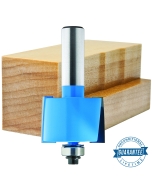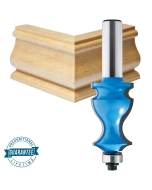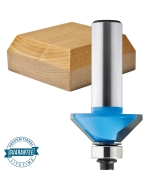Video: Router Bits for Beginners

In this video the most common types of router bits are explained for the novice woodworker. The Rockler router bits highlighted in this video include: Straight, Rabbeting, Round Over, Flush Trim, Roman Ogee, Chamfer, and Undersized Plywood Bits.
Skillbuilder Video
Router Bits for Beginners - Video Transcript
The router is one of the most useful versatile tools in any shop. Of course it's not much good without router bits. And if you're new to routing, the hundreds of options can be confusing. How do you choose? Here's what you need to know.
Router bits come in many profiles. That's the term for the shape of the cutting edge. Straight bits make straight cuts to form a groove or a dado that's a groove across the wood grain. They also can hollow out an area for mortis or decorative inlay and they come in a variety of sizes.
Rabbiting bits are guided by a pilot bearing at the tip and they're designed to cut a rabbit or shoulder in the edge of a work piece often to join it to another piece. You can buy these bits in a set that includes bearings of different diameters. That means you can cut rabbits of different sizes with a single bit.
Flush trim bits make the edge of one material even with the edge of another. You use this type of bit to trim laminate flush with the material underneath or to round multiple identical pieces with a pattern. Flush trim bits usually have a pilot bearing. That's the same diameter as the bits cutter.
Edge forming bits come in different profiles and are used to cut a decorative edge. These include chamfer bits, round-over bits, ogee bits, edge beading bits and cove bits. Many of these bits also have a pilot bearing.
There also are a variety of bits made for special applications you can use sections of multiple profile molding bits to cut different decorative edge patterns and with stile and rail bits and raise panel bits you can make frame and panel doors yourself. Keep in mind though, that these bits tend to be larger and must be used in a table mounted router for safety.
Besides the different types of bits, you need to know that there are two common sizes of router bit shanks, quarter inch and half inch. Many routers come with collets for both sizes but, some accept only quarter inch bits. Whenever possible use bits with half inch shanks, you'll get less vibration and they typically produce a smoother cut.
Most router bits have solid carbide cutters or carbide tipped cutters which are harder than high speed steel and will hold an edge a lot longer. But they're also more brittle so, handle them carefully. You don't want to drop them.
Here at Rockler we offer our own line of router bits designed for the serious woodworker. They're made with thick high quality carbide and sharpened with diamond abrasive. They're also precision balanced and have a non-stick coating to prevent resin buildup.
To make it simple for beginners, we offer a five piece carbide tipped starter set that includes a rabbiting bit with four bearings, a straight bit, a round-over bit, a chamfer bit and a Roman ogee bit all have sturdy half inch Shanks. We also have sets of straight bits in the most common diameters and a three piece set match to the actual thickness of standard plywood.
We're confident that Rockler router bits will provide safe and smooth cutting for a very long time. That's why we back our bits with an unconditional guarantee. If you're not completely satisfied return them for a refund or replacement. If you have more questions, contact our technical experts or your local Rockler store. You can also check out our catalog or go online at Rockler.com
Keep the inspiration coming!
Subscribe to our newsletter for more woodworking tips and tricks


